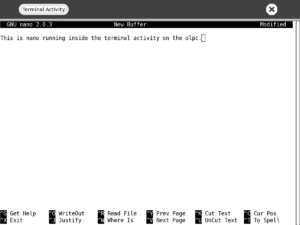Nano: Difference between revisions
Jump to navigation
Jump to search

(added screenshot) |
|||
| Line 12: | Line 12: | ||
==External Links== |
==External Links== |
||
* |
* [http://en.wikipedia.org/wiki/Nano_%28text_editor%29 Wikipedia page about the Nano text editor] |
||
* |
* [http://www.nano-editor.org Official home page for Nano] |
||
* |
* [http://www.nano-editor.org/dist/v2.0/nano.html Online HTML documentation] |
||
Revision as of 10:22, 17 January 2008

Screenshot showing Nano inside the Terminal activity.
- Nano is a text editor built into recent builds of the OLPC.
- It runs from the shell, not from within the Sugar desktop, so is mainly of use to developers.
- It is an alternative to the vi text editor.
- Nano is based on Pico, an older text editor familiar to users of the Pine e-mail program.
Usage Tips
- Although ctrl-key combinations are listed for all commands, you can use the Escape key (black circled x) as a substitute for combinations that Sugar reserves for other purposes, such as CTRL-O for WriteOut (file save, represented as ^O on the nano menu). Instead, press Escape twice, then the letter O. The usual WriteOut "File Name to Write:" prompt will appear.
Copying to Journal
Once you have saved your text file within the linux file system, you may need to copy it into the Journal so that it can be viewed within Sugar. This page shows how to do this.